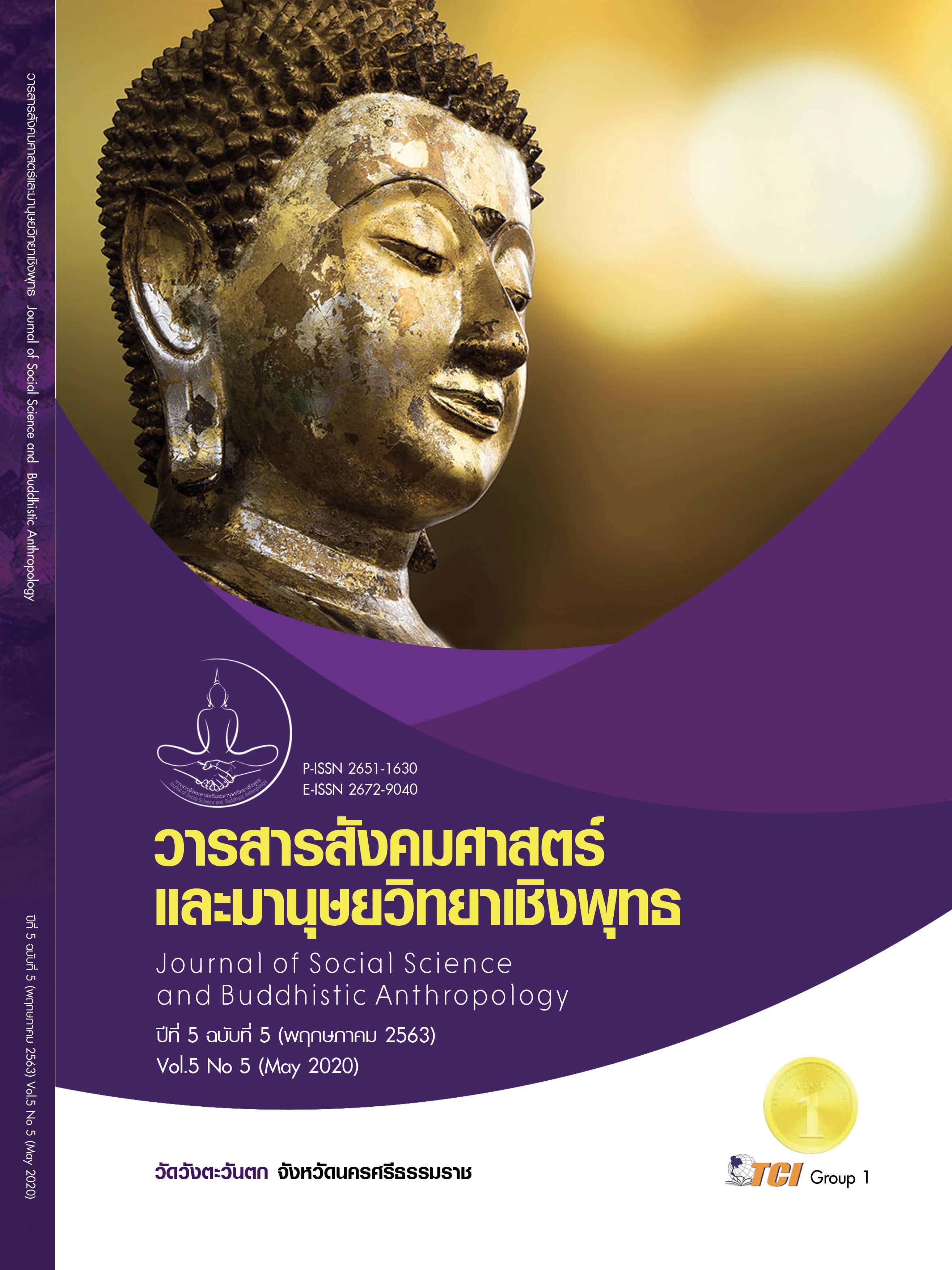THE INTEGRATION OF BUDDHIST ETHICS AND SUFFICIENCY ECONOMY PHILOSOPHY FOR HAVING GUARANTEED THAI FAMILY STABILITY IN POSTMODERN SOCIETY
Keywords:
Integration, Buddhist Ethics, Sufficiency Economy Philosophy, Thai Family Stability, Postmodern SocietyAbstract
The objectives of this article were: 1) to study the concept of Thai family stability in postmodern society concerning with Sufficiency Economy Philosophy. 2) to study the Buddhist Ethics on strengthening the family stability. 3) to integrate the Buddhist Ethics and Sufficiency Economy Philosophy for Having Guaranteed Thai Family Stability in Postmodern Society. 4) to create a new body of knowledge and model of building Stability of family institution . This research was a qualitative one based documentary research upon the analytic, appreciative and applicative approach so as to lead to the creativity of new body of knowledge in philosophy and religion. The results of research were found as follows: The postmodern Thai family is one that is dynamically spinning the wheel of digital society. It has been faced the social disruption leading to the mobility. To strengthen such the members of Thai family stability for smoothly living proceeding, balancing and self-reliant, it must necessary aware to apply in Sufficiency Economy Philosophy and the principle of Buddhist ethics which is the way of common action of being good or evil. The members of postmodern Thai family should be conducted by the five precepts to not become the antagonistic family and be applied Sufficiency Economy Philosophy in both individual and family levels. Whenever the treat causing the capitalism consumerism and digital society to effect many transformations, being capable to have guaranteed Thai Family Stability in Postmodern Society. As for the creativity of new body of knowledge on the integration of Buddhist Ethics and Sufficiency Economy Philosophy for having guaranteed Thai family stability in postmodern society is PFQ = MEL PHD.
References
จิตตินันท์ เดชะคุปต์ และคณะ. (2553). การศึกษาและพัฒนารูปแบบการเสริมสร้างหลักประกันความมั่นคงของครอบครัวไทย. ใน รายงานการวิจัย. ศูนย์วิจัยและพัฒนาครอบครัวไทย มหาวิทยาลัยสุโขทัยธรรมาธิราช.
พระครูปริยัติกิจวิธาน (ไพสิทธิ์ ศรีรอด). (2561). การประยุกต์ใช้พุทธญาณวิทยาของหลักกาลามสูตรในสังคมไทยหลังนวยุค. ใน ดุษฎีนิพนธ์ปรัชญาดุษฎีบัณฑิต สาขาวิชาปรัชญาและศาสนา. มหาวิทยาลัยเซนต์จอห์น.
พระครูปลัดสุวัฒนเมธาคุณ (ชัยยันต์ สืบกระพันธ์). (2555). บูรณาการหลักพุทธจริยศาสตร์ในการดำเนินชีวิตของคนไทยในสังคมปัจจุบัน. ใน ดุษฎีนิพนธ์ศาสนศาสตรดุษฎีบัณฑิต สาขาวิชาพุทธศาสน์ศึกษา. มหาวิทยาลัยมหามกุฏราชวิทยาลัย.
พระครูพิพัฒน์กิตติสุนทร (สมศักดิ์ หนูดุก). (2559). การประยุกต์ใช้พุทธปรัชญาและปรัชญาของเศรษฐกิจพอเพียงเพื่อสร้างพลังชุมชนให้เข้มแข็งในอำเภอนาทวี จังหวัดสงขลา. ใน ดุษฎีนิพนธ์ปรัชญาดุษฎีบัณฑิต สาขาวิชาปรัชญาและศาสนา . มหาวิทยาลัยเซนต์จอห์น.
พระพรหมคุณาภรณ์ (ป.อ. ปยุตฺโต). (2548). เศรษฐศาสตร์แนวพุทธ. กรุงเทพมหานคร: บริษัท สหธรรมิก จำกัด.
พระวรวรรษ ธมฺมทินฺโน (มีกุล). (2562). วิธีการแก้ปัญหาความขัดแย้งในครอบครัวตามหลักพุทธธรรม. ใน วิทยานิพนธ์พุทธศาสตรมหาบัณฑิต สาขาวิชาพระพุทธศาสนา. มหาวิทยาลัยมหาจุฬาลงกรณราชวิทยาลัย.
มหาจุฬาลงกรณราชวิทยาลัย. (2539). พระไตรปิฎกภาษาไทย ฉบับมหาจุฬาลงกรณราชวิทยาลัย เล่มที่ 11. กรุงเทพมหานคร: มหาจุฬาลงกรณราชวิทยาลัย.
แม่ชีวงเพชร คงจันทร์. (2559). รูปแบบการเสริมสร้างความมั่นคงของครอบครัวไทยเชิงพุทธบูรณาการ. ใน ดุษฎีนิพนธ์พุทธศาสตรดุษฎีบัณฑิต สาขาวิชาพระพุทธศาสนา. มหาวิทยาลัยมหาจุฬาลงกรณราชวิทยาลัย.
สถาบันการศึกษาทางไกล กศน. (2560). ปัญหาชีวิตครอบครัวและแนวทางแก้ไข. เรียกใช้เมื่อ 20 ธันวาคม 2560 จาก http://nefe.nfe.go.th/elearning/courses/51/page 213.htm
สมบูรณ์ บุญโท. (2553). ปรัชญากระบวนทรรศน์กับการพัฒนามนุษย์ สังคมและธรรมชาติ สิ่งแวดล้อม. กรุงเทพมหานคร: สวนโลก - สวนธรรม สำนักพิมพ์.
สุกัญญา สุดบรรทัด. (2561). วิถีแห่งพลเมืองเน็ต. เรียกใช้เมื่อ 10 สิงหาคม 2561 จาก www.royin.go.th/?p = 17920









